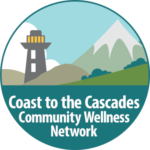Addressing Violence in Rural Communities (AVIROC)
The AVIROC project aims to enhance the capacity of the Coast to the Cascades Community Wellness Network (CCCWN) and its regional health coalition, Partners for Health (PFH), to improve health outcomes in the region through network development centered on child abuse, domestic violence, and human trafficking. Utilizing a collaborative approach, the project is specifically designed to address critical service gaps identified in our 2022 community health needs assessment. The needs assessment identified survivors of child abuse and domestic violence as highly vulnerable populations in Lincoln and East Linn counties, where few services and supports are available in their rural communities. While the needs assessment did not explicitly address human trafficking, anecdotal information from local coalitions highlighted this as an area of concern for the region.
Five CCCWN/PFH members, all local organizations actively engaged in addressing these issues, will collaborate to fill gaps in outreach, education, and services in our rural communities. Through AVIROC, CCCWN/PFH will develop and implement a coordinated approach to address these issues, conducting outreach and education with staff, providers, and the public, and expanding survivor services into our rural and underserved communities. Project partners, including ABC House, Acosta Services (AS), Center Against Rape and Domestic Violence (CARDV), Sarah’s Place, and the Linn-Benton Anti-Trafficking Coalition (LBATC), work together toward a healthier and safer community.
The AVIROC project is committed to coordinating and collaborating to provide advocacy, counseling, and various services for survivors of child abuse, domestic violence, and human trafficking. Outreach and education will be conducted to reach and inform survivors about new services. A broader education and outreach effort will educate and train medical and social service professionals and community organizations. A region-wide media campaign will raise awareness among community members about these otherwise invisible issues and how to access support services.
Grant Activities
AVIROC will develop the framework and relationships to support bringing services directly into our underserved, rural communities, significantly improving accessibility. In east Linn County, counseling will be provided one day/week for children, reaching at least 200 rural children. Victim advocacy and outreach will be conducted two days/week for individuals experiencing domestic violence, supporting at least 240 rural survivors.
In Lincoln County, an experienced and well-respected leader in the Latinx community will convene community forums and focus groups with at least 300 Latinx, Mam-speaking, and other marginalized community members. The dual purpose of this Year 1 work is to 1) raise awareness among these populations and 2) assess needs and collect community input to guide the development of an Action Plan.
- Goal 1: Strengthen and sustain regional Coast to the Cascades Community Wellness Network/Partners for Health to enhance capacity to provide child abuse, domestic violence, and human trafficking prevention and support services in Lincoln and east Linn Counties.
- Goal 2: Increase knowledge around child abuse, domestic violence, and human trafficking through outreach and education in Lincoln and East Linn Counties.
- Goal 3: Expand access to services that address child abuse, domestic violence, and human trafficking in Lincoln and East Linn Counties.
- Goal 4: Sustain activities and services of Coast to the Cascades Community Wellness Network/ Partners for Health that address child abuse, domestic violence, and human trafficking through comprehensive planning for Lincoln and East Linn Counties.
Partnerships
The AVIROC project partners bring extensive experience providing services to survivors of child abuse, domestic violence, and human trafficking across Lincoln and Linn counties. They are experienced in working together and supportive of each other’s work. All AVIROC partners are dedicated to increasing services and education in our rural communities for community members who may otherwise be unable to access needed support.
Impact
The AVIROC project will improve access, expand capacity and services, enhance outcomes, and sustain project activities as outlined in the Work Plan. Activities will have both short- and long-term impacts across the region.
- Increase access to care and expand the capacity of local agencies to offer services for survivors of violence. This will increase access to counseling and supportive services in our rural communities.
- Serve 240 domestic violence survivors and 200 child abuse survivors with increased access and expanded services. The provision of sexual violence prevention education to 6,200 middle and high school students will plant the seeds for the long-term prevention of domestic violence.
- Increase access to training and education for medical providers and social services professionals. The strangulation training will increase the detection of violence survivors and expand the long-term capacity to respond effectively to strangulation. We expect to train 100 providers.
- Annual summits will increase knowledge and train service professionals on critical issues related to child abuse, domestic violence, and human trafficking. Summits will reach 600 professionals and community members.
- Create awareness around child abuse, domestic violence, and human trafficking. The media campaign will reach 60,000+ community members. The community outreach will educate members of 50+ rural community organizations.
- The network development activities with the CCCWN and PFH will support the sustainability of project activities, as well as grow the network’s work to address child abuse, domestic violence, and human trafficking.
- The economic impact will be reviewed as the goal to impact the incidence of child abuse, domestic violence and human trafficking is reduced across the region, which will reduce the costs of emergency medical care.
Contact Us
If you would like to learn more, please contact Sommer McLeish, smcleish@samhealth.org



